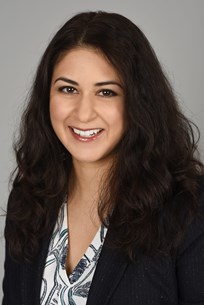Meeting
2022 ASCO Annual Meeting

Massachusetts General Hospital and Harvard Medical School, Boston, MA
Sophia C. Kamran , Beow Y. Yeap , Anushka Ghosh , Christopher Aldrighetti , Henning Willers , Neha Vapiwala
Background: Gender disparities in academic medicine are a long-acknowledged concern. Efforts to recognize this imbalance and increase inclusivity continue, particularly in academic medical conferences. In June 2019, NIH Director Francis S. Collins MD, PhD publicly called for an end to all-male speaking panels (“manels”). It is unclear whether academic oncology conferences followed suit. We investigated the prevalence and longitudinal trends of manels and gender representation at the ASCO Annual Meeting during 2018-2021. Methods: Using ASCO online programs, 2018-2021 faculty information was obtained. Data collected included perceived or self-reported gender, medical specialty, panel role (chair vs. non-chair), type of session, and topic. Primary outcomes included percentage of manels and proportion of female panelists over time. Female representation among chairs, specialties, and topics were evaluated. Cochran-Armitage test was used to analyze time trends in the proportion of manels and female representation. Fisher’s exact test was used to compare each session type, topic, or specialty to other categories combined. P-values are based on a two-sided hypothesis. Results: During 2018-2021, there were 670 sessions total, 81 of which (12.1%) were manels. Among 2,475 faculty members, 1,181 (47.7%) were females. Over time, there was a significant decrease in the number of manels, from 17.4% in 2018 to 9.9% in 2021 (p = 0.030) and a corresponding increase in proportion of female panelists from 41.6% to 54.0% (p < 0.001). The largest decrease in manels occurred between 2018 (17.4%) and 2019 (10.5%). Among session type and topic, the highest proportion of manels was observed for leadership/special sessions (17.1%, p = 0.419) and translational/pre-clinical topics (19.6%, p = 0.024), respectively. The chair role was majority male (53.2%) in 2018 but increased to > 50% female representation in 2019-2021 (p = 0.157). The lowest proportion of female panelists were in pathology/radiology/dermatology specialties (combined 26.2%, p = 0.001). Female panelists were underrepresented for the topics of genitourinary cancers (38.6%, p = 0.029) and translational/pre-clinical sciences (36.7%, p < 0.001). Females were overrepresented in the topic of supportive oncology (70.3%, p < 0.001). There was a positive trend toward improved female representation among translational/pre-clinical sciences (27.4% in 2018 to 41.8% in 2021, p = 0.031), but with little improvement among genitourinary cancers (41.1% in 2018 to 40.7% in 2021, p = 0.969). Conclusions: The number of female ASCO panelists increased during the study period and surpassed 50% in 2021, with a corresponding decrease in the proportion of manels. Still, there are certain topics/specialties where female representation has remained stagnant. ASCO Annual Meeting organizers should continue to strive for diverse gender representation and the elimination of manels.
Disclaimer
This material on this page is ©2024 American Society of Clinical Oncology, all rights reserved. Licensing available upon request. For more information, please contact licensing@asco.org
2022 ASCO Annual Meeting
Poster Session
Professional Development and Education Advances
Medical Education and Professional Development
Workplace Disparities/Issues
J Clin Oncol 40, 2022 (suppl 16; abstr 11053)
10.1200/JCO.2022.40.16_suppl.11053
11053
244
Abstract Disclosures
2022 ASCO Annual Meeting
First Author: Jessica Caro
2024 ASCO Genitourinary Cancers Symposium
First Author: Regina Barragan-Carrillo
2023 ASCO Quality Care Symposium
First Author: Christina Hum
2024 ASCO Genitourinary Cancers Symposium
First Author: Daniela V. Castro